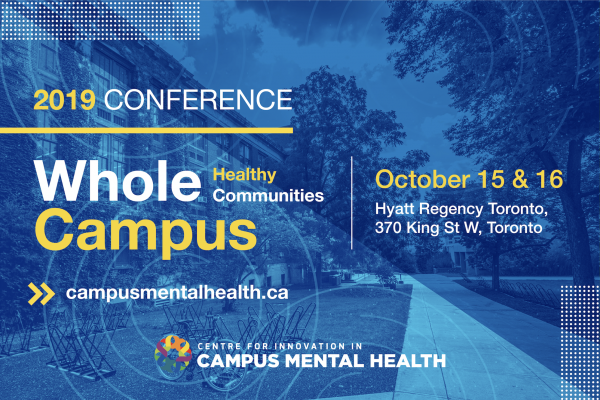Conference slides
Concurrent Sessions (Day 1):
Concurrent Sessions (Day 2):
PLEASE VISIT OUR NEW CONFERENCE WEBSITE
https://campusmentalhealth.ca/conference-2019/

Campuses are the sites of a wide range of mental health challenges, from exam-related stress and roommate relationship issues to anorexia and depression. A characteristic of a mental healthy campus would be students feeling safe and supported in talking about their concerns. At such a campus, everyone in the institution takes ownership of student success. Student affairs administrators, faculty, residence directors, and counsellors are often on the front lines with distressed students, and they – along with many other campus constituencies – are searching for ways to best serve students’ individual needs and those of the student body as a whole.
This year’s theme, Whole Campus, Healthy Communities, looks at campus communities in their entirety. We cannot fully address student mental health without also looking at the ecosystem in which students spend a majority of their time- the campus environment. In order to promote mental well-being for students, we should also take into account the wellbeing of other campus community members, such as staff and faculty. In addition, we are also looking at larger ecosystems which students might inhabit before and after their post-secondary education. Issues like transitions from high school to post-secondary and employment prospects after graduation can have an impact on how we help students to thrive.
To facilitate this discussion, we will be exploring five themes. These are:
1. Substance Use
2. Mental Health Strategies
3. Wellness and Health Promotion
4. Diversity and Inclusion
5. The Student Voice
Substance Use
Presentations in this stream will focus on the use of drugs, alcohol and other substances on campus. Example topics might include smoke-free campuses, as well as other critical issues such as binge drinking on campuses and driving under the influence of alcohol.
Mental Health Strategies
The creation of successful campus mental health strategies can occur only through informed policies, targeted mental health promotion, and integrated care for students struggling with mental health challenges. Presentations in this stream will focus on the development, implementation and evaluation of campus mental health strategies.
Wellness and Health Promotion
Presentations in this stream will highlight any innovative mental health programs that focus on early identification, prevention and health promotion. Examples might include integrated mental and physical wellness programs, peer supports and resilience-based programs.
Diversity and Inclusion
Institutional leadership and campus models for diversity and inclusion that simultaneously advance underserved students’ educational access and success and promote the flourishing of institutions have a significant impact on mental health. Presentations in this stream will address barriers based in discrimination and new opportunities related to demographic change, sharing practices and programs that pursue established ideals about equity.
The Student Voice
In order to effectively address mental health issues for students, it is vital that student voices are brought to the table in meaningful, constructive, and sustainable ways. These presentations will focus on the student perspective, fostering understanding, opening lines of communication, and building access.

Concurrent Sessions (Day 1):
Concurrent Sessions (Day 2):
April 9, 2019 10:00AM - 4:00PM EST
May 30, 2019

